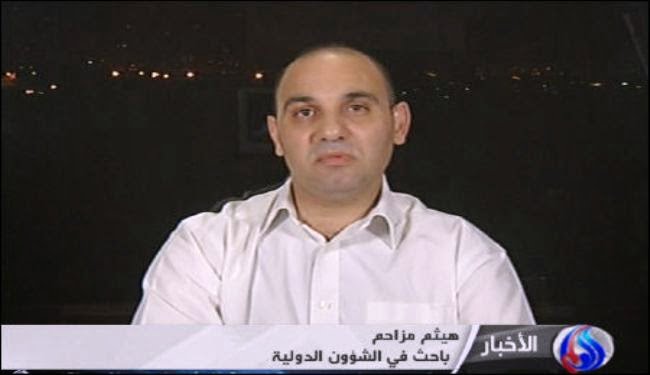
The Levant News - Here is a special interview with Dr. Haytham Mouzahem, director of Beirut Center For Middle East Studies regarding the ongoing battles of Syria's South:
Q-What do you think this means for the overall status of the Syrian conflict?
The battle of the Syrian south comes to complete the Syrian regime control over the rest of the Syrian territories, which are still under the control of the jihadi or rebel groups. These are the latter areas, in addition to Idlib and some areas of the east and northern Syria.
If the Syrian army succeeds in regaining control of the south by force or negotiations, it will focus its efforts on the Syrian east and north to complete the liberation of these areas, whether through a political settlement or various complex battles because of the Turkish factor and the Kurdish-American factor, as well as the presence of Hayaat Tahrir Al-sham, the Syrian branch of al-Qaeda.
Q— What do you expect to happen in Daraa between the rebels and the regime? Will the regime destroy the rebels, or will they try to negotiate reconciliation/surrender agreements first?
So far, the "moderate" rebel forces, like the "Free Syrian Army," seem to be shocked and confused and they do not resist in many areas, while the fierce resistance is being carried out by Hayaat Tahrir Al-sham. Part of the “Free Syrian Army” wants to surrender and join the Syrian army. The Syrian government is trying to negotiate with the moderate rebels to surrender themselves or withdraw to other areas or hand over their weapons and stay in their villages and towns under agreements similar to the agreements and reconciliations that took place in the eastern Ghouta and other Syrian areas.
The eastern Ghouta model appears to be repeated, although the prospect of insurgents staying in their villages or joining the regular army is more likely, while jihadists may prefer to withdraw to Idlib or fight hard.
Q— If they make agreements, how favorable or unfavorable will the terms be to the local towns, rebels and civilians?
If those agreements reached will include that some rebels remain in their towns and villages after the handover of their heavy weapons, they will be suitable for the civilians who will avoid heavy battles that would kill a lot of civilians and lead to the displacement of others. The agreements and reconciliations that the Assad government has signed with rebels and some opposition towns have relatively succeeded in some Syrian cities such as Homs, Zabadani, and the countryside of Damascus.
Q- assuming the regime will retake control in the end, how long could it take for that to happen?
If agreements and reconciliations are achieved within a short period of time, the regime may regain control of the province within a relatively short period of no more than three-four months. The Syrian military advances are more quickly in some villages and towns, prompting the rebels and their regional sponsors to sign agreements and reconciliations.
Q— Is there any possibility of the international players (U.S., Russia,
Jordan, Israel) negotiating a diplomatic solution at this point?
Of course, this process is in parallel with Russian negotiations with both America and Jordan on the one hand and between Russia and Israel on the other hand. Previous negotiations have taken place in this regard and it appears that the regional and international parties have implicitly agreed to the Syrian army’s control of south-west of Syria with Russian guarantees to remove Iranian and Hezbollah forces from the border with the Israeli-occupied Syrian Golan as well as Jordan's borders. But there is no confirmed information about the outcome of the Russian-Israeli negotiations and the extent of the understandings reached, but there is implicit Israeli acceptance of the deployment of the Syrian army in the south-west with Russian support in return for the removal of the Iranians and their allies.
Q-what is your sense of Israeli-Iranian/Hezbollah tensions at this
point? Will the Daraa campaign increase those tensions, since Assad’s
forces will be coming closer to the sensitive Golan Heights border?
The ongoing Israeli raids on Iranian, Syrian and Hezbollah positions in Syria suggest that Tel Aviv is trying to prevent any permanent Iranian military presence and Hezbollah in Syria even if it is far from the Golan and the border with Israel.
Ideologically, neither Iran nor Hezbollah will relinquish the idea of confronting Israel, working to liberate the Syrian Golan from occupation, and opening a second front from Syria in front of Israel at any potential war against Iran and Hezbollah. But in real terms, Iran may bow to Russian pressure and the de-facto balance of power and to the Syrian regime's interest in calming the confrontation with Israel and moving away from the border without a complete withdrawal from Syria. Iranians and Hezbollah say that the presence of their forces came at the request of the Syrian government and the fact that Iran has provided tens of billions of dollars to the Syrian regime and lost hundreds of soldiers and officers there, In addition to the losses of Hezbollah and other Shiite militias, that means Iran would not accept to give up these sacrifices on behalf of Russia or US or Israel without getting something in return, like some permanent influence in Syria and guarantees to Hezbollah in Lebanon.
7— what will the Daraa offensive mean for the big picture of the war?
The international-regional understanding regarding the Syrian south will strengthen the political process and help to re-launch the talks of Astana and Geneva for a political solution sponsored by Russian-American and Turkish-Iranian as well as an Arab and Israeli acceptance. That will also facilitate the process of ending the presence of the ISIS and finding a compromise of the Kurdish issue that will ensure Turkey's concerns and interests within the framework of the Syrian state. But this will not happen within a few months and may extend to two years or more.






